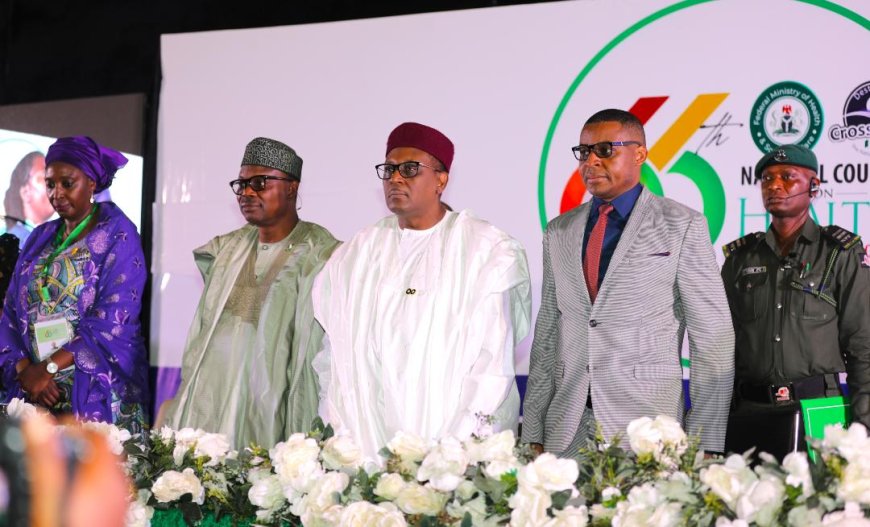Boost health budgets for 2026, FG urges states

The Federal Government on Thursday urged the state governments to increase their health sector allocations as part of efforts to enhance healthcare delivery and accelerate progress toward achieving Universal Health Coverage.
Speaking at the National Council on Health in Calabar, the Coordinating Minister of Health and Social Welfare, Prof. Muhammad Pate, emphasised that quality healthcare requires adequate funding.
The National Council on Health, a high-level governance body responsible for formulating and coordinating health policies nationwide, brings together federal and state health leaders to assess progress and set new strategic directions for the sector.
He urged states to ensure a minimum one per cent increase in their health budgets for 2026 compared with 2025, highlighting the importance of investing in primary healthcare, hospitals, medical equipment, vaccines, and reproductive health commodities.
“As we look forward, we expect faster progress for Nigeria in terms of reaching the universal health coverage targets. But we’re still far below where we need to be. Quality health is not cheap. You have to invest in it. So, as we get to 2026, we’re working very hard to advocate so that we have at least a 0.6 per cent increase in the portion of health in the Federal Government budget, at least to get to six per cent.
“Already, we are at an unprecedented level in terms of prioritisation of health in the federal budget, and thanks to Mr. President. But we need to continue to build because the infrastructure is there to deliver it, and the results are beginning to show.
“So, I urge each of the states and Your Excellencies (the Commissioners of Health) to convey our message to all state governors, borrowing from my colleagues, the Commissioners of Health. We hope that in 2026 each state will see at least a one per cent increase in their health budget relative to 2025. That’s our prayer as we start this, so that the states also increase their contribution to health.”
He explained that the funds would be strictly reserved for essential health needs, including primary healthcare, medical equipment, vaccines, and reproductive health supplies.
According to him, the resources would be used responsibly to ensure efficiency, effectiveness, and improved service delivery across the health sector.
The Minister also stressed the need for transparency and accountability in the use of funds, calling on civil society organisations to support monitoring efforts.
Reflecting on progress made, Pate recalled that two years ago, in Ekiti State, the Council took far-reaching decisions aimed at reforming Nigeria’s health system at all levels.
He said the Council adopted a sector-wide approach to strengthen governance, improve efficiency, and enhance the quality of healthcare delivery nationwide.
The Minister noted that the reforms initiated at that time targeted critical areas of the health system, such as expanding primary healthcare services and health insurance coverage, revamping hospitals, improving human resources for health, strengthening supply chains, and integrating innovative health technologies. He said the reforms are already yielding tangible results.
“At the Joint Annual Review last week, we noticed a 17 per cent reduction in maternal mortality through the Maternal and Neonatal Mortality Reduction Innovation and Initiative in local government areas.
“At least, we’re changing the trajectory. Neonatal mortality is beginning to improve, access is improving, quality remains high, and the confidence of Nigerians in the health sector is going up. That is precisely why President Bola Tinubu unveiled the Nigeria Health Sector Renewal Investment Initiative in December 2023 so that we do precisely that under his leadership,” he stated.
In his address, Governor Bassey Otu of Cross River State noted that the Council remains the highest decision-making body on health matters in the country and must therefore command full attention and commitment to policy implementation.
Otu emphasised that the theme should inspire collective determination to ensure that quality healthcare reaches every Nigerian.
The Governor, who was represented by his Deputy, Peter Odey, said, “We should be determined to make a difference in ensuring healthcare is available to all Nigerians, whether rich or poor. This session of the National Council on Health should bring us closer to achieving Universal Health Coverage by strengthening primary healthcare, building a sustainable health workforce, and providing health and social insurance schemes.
“Our collective goal is to eliminate out-of-pocket expenses, particularly for the vulnerable. This is our earnest desire for the 66th session of the NCH. As a state government, we are intentional in adopting and implementing policy in this direction. This initiative includes a primary healthcare-based palliative programme which targets rural pregnant women, children under five, and the elderly over 70.”
He also announced that Cross River State is among the first to implement a six-month maternity leave policy for pregnant women.
He added that the state has been recognised for its strong compliance with nutrition standards, as observed during a recent national assessment.

 admin
admin 


